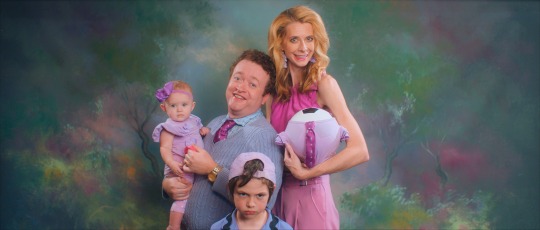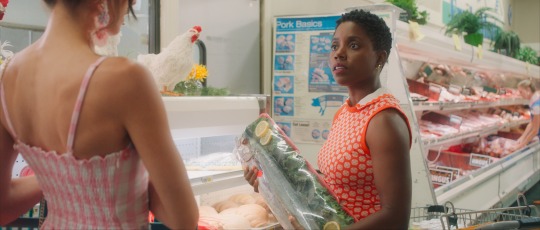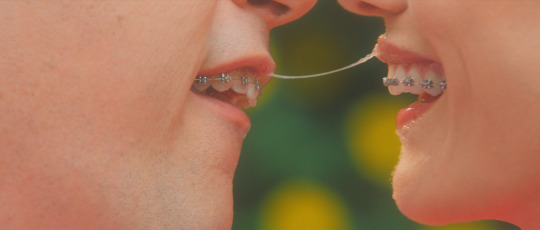#which you can really see in how he talks about dl afterwards in streams and such he openly expresses guilt specifically for tango
Photo

Demented Suburbia.
Greener Grass writer-director-stars Jocelyn DeBoer and Dawn Luebbe share their favorite films while pontificating on extreme politeness, John Waters and The Swimmer.
New indie comedy Greener Grass is not the Netflix marijuana documentary Grass is Greener, but you could be forgiven for making that mistake after the directors of the former gave out free marijuana at a recent outdoor screening, according to their friend Jim Cummings (who makes a cameo in the film, and lurks on Letterboxd).
It’s been a case of watch-and-learn for other up-and-coming filmmakers, as Jocelyn DeBoer and Dawn Luebbe have stormed the 2019 festival scene with their utterly weird and wonderfully bonkers debut feature. Nobody is doing red carpet lewks like them, nobody else is handing out free weed (that we know of), and nobody else has made a film quite like theirs. Attracting comparisons to the films of David Lynch, Anna Biller and Tim Burton, but utterly at home in its own creepily perfect world, Greener Grass is the WTF-is-up-with-white-people film America deserves right now.
And it’s the culmination of years of creative growth for DeBoer and Luebbe, friends and Upright Citizens Brigade veterans, whose suburban moms Jill and Lisa first appeared in the Paul Briganti-directed short of the same name (for which they won the 2016 SXSW Special Jury Award for Recognition for Writing). DeBoer and Luebbe stepped into the directing chairs for The Arrival, another short exploring demented suburbia, while developing Greener Grass for television.
When a series failed to eventuate, they spun Jill and Lisa’s world into the feature film, landing on the unforgettable location of Peachtree City, Alabama, a real town built for the golf-cart lifestyle. Greener Grass hit the spot for many Letterboxd members at its Sundance premiere: “Just what I needed after seeing so many dark films!” was Alicia Malone’s reaction. “Unlike anything I've ever seen but … tackles ideas I have never been more familiar with,” wrote Karsten.
The story kicks off when Lisa compliments Jill on her newest baby and Jill, following suburban rules of politeness, hands the baby over to Lisa to raise. This is far from the strangest thing that will happen to a child in Greener Grass.
We needed to know where this wild duo get their filmmaking inspiration from. When we spoke with DeBoer and Luebbe they were in “high heaven”, having just held the LA premiere of Greener Grass.

Lisa, Dennis, their son Bob, their adopted daughter Madison (now Paige), and their newborn soccer ball, in a family portrait from ‘Greener Grass’.
What were some of the real-life ‘greener grass’ moments that inspired your film?
Dawn Luebbe: There’s one story which Jocelyn tells about her aunt who was at a dinner party one night. She was in the kitchen talking to the host and complimented them on her apron—“that’s a cute apron!”—and the host took it off and said it “you must have it, take my apron.” At once she was like, “oh no, I just like it, I don’t need it,” and the host insisted and wouldn’t drop it. So that night Jocelyn’s aunt left with that apron. Of course, that’s just a very small example of politeness taken to the extreme. We took that general vibe and added to it and really blew it out.
Jocelyn DeBoer: I feel like we experience this at restaurants too. Dawn and I are from the Midwest, so we have a problem where no-one ever really wants to eat the last bite of something that’s shared. I do remember one experience where I was on a double-date with some acquaintances I didn’t know so well and we were eating sushi. Someone had those crispy rice things that have some spicy tuna on top and when the waiter brought it out, one of them fell to the floor. Our friend just picked it up and said “10 second rule!”. The waiter felt bad and offered to bring new ones and we were saying, “Yes, get the new sushi. Don’t eat that one off the floor!” But the person didn’t want to make the waiter feel bad and ate it right in front of them. I thought, ‘this is a Greener Grass moment for sure!’.
You’ve said elsewhere that you tried to avoid referencing other films in the development of yours, but can you tell us some films that you love, that peddle in the same story area of ‘demented suburbia’?
JD: We always admit that we were watching Twin Peaks together at the time we were making our short, so there’s no denying that David Lynch is an inspiration to us. Mulholland Drive, of course. Blue Velvet, too. The two of us just love John Waters, he rocks.
DL: We love how John Waters satirizes suburbia but he also clearly has such love and adoration for it too. It’s our dream to strike the same balance.
JD: Yeah, we’re laughing with the people we grew up with, not just at them.
DL: I would say also Edward Scissorhands was another movie that was a point of reference in terms of the bright pastel color-block world, with this element of darkness filtering in.
JD: We love satires like Brazil, the visual comedy especially. We both loved that surreal world. Luis Buñuel, of course, with The Discreet Charm of the Bourgeoisie, has the sketch-like aspects in a narrative film we wanted to do. We could just go on!

Jill (Jocelyn DeBoer) and Marriott (Janicza Bravoin) in a scene from ‘Greener Grass’.
Greener Grass technically has a lot in common with great horror films—one of our members, Sara, writes: “This reminded me so much of Halloween with the use of voyeurism and the John Carpenter-esque score… Suburban moms are ten times scarier than Michael Myers”. So since it’s Hallowe’en, tell us your favorite, go-to horror films.
JD: I don’t know if this counts as a Hallowe’en movie but I love Rosemary’s Baby. That and The Shining come to mind first.
DL: Those two very much for me too. You know, I have to admit that maybe until about five years ago, I thought I was not a fan of horror. I feel a little not in the best position to speak to that. I tried very much to cram in what I can and then I discovered I actually love horror movies.
JD: The funny thing is that no-one loves true crime more than Dawn!
DL: Yes, true crime is my greatest passion.
Which film turned you onto horror, Dawn?
DL: I actually think it was Rosemary’s Baby. I saw that and thought ‘this is very scary and I love it’. This is more recent, but Get Out, too. I found the marriage of comedy and horror to just be incredible and the visuals in that movie, to have such a sense of cinematic comedy-horror, just blew my mind.
You gave some of the best lines to the child actors in Greener Grass. What was your approach to working with them to capture the absurd spirit of the film?
DL: That’s so nice! We absolutely love Julian Hilliard, who plays Julian, and Asher Miles Fallica, who plays Bob. From the second we saw their audition tape, they so got the tone, the characters, and they just jumped off the screen for us. They’re so mature in a way. They understood the comedy and the tone in a way we did not anticipate.
JD: They took their roles so seriously. One story we love about Julian is how he had to fall in the pool and we shot that very early on. We told him we want him to fall just like a plank and we’re showing him YouTube videos of planking so he was practising it in the hotel pool. We went on the day to shoot that scene, and the take that’s in the movie is our first and only take. He just nailed it perfectly. A couple weeks later, we went to shoot the first scene of the movie, which is when he falls in the soccer field. We go to shoot it and Julian starts to fall in a hard plank, just like he did in the pool but on the grass. We were like, “wait, no no no, you don’t have to fall like that!” and he just looked at us and went, “but that’s how Julian falls!”
What streaming platform is Kids with Knives on? Seriously: we’re fans of films that build a complete world within, including the fake shows and commercials you see playing on television sets. Can you tell us some inside stories of developing those?
JD: Those were so much fun for us to work on.
DL: These kids were just so incredibly enthusiastic and Jocelyn had them circle round and asked them what kind of gymnastics can you do, let’s see what you got. And then one after the other they were doing the splits, back-handstands… We thought, ‘this is great—Gymnastics and Knives!’ We should have been filming that.
We’ve really enjoyed showing your trailer to people for that ‘what-the-fuck’ reaction. What’s a bizarre film that you love to recommend to people? (We asked this same question to Daniel Scheinert who directed Swiss Army Man and The Death of Dick Long and he said Greener Grass.)
JD: Wait, are you kidding?! That’s so nice, oh my gosh! The first film that came to mind is Dogtooth. I’m always curious to talk to people about that one. Dawn, what about The Swimmer? Have you seen The Swimmer? You have to. It’s the Burt Lancaster vehicle.
DL: It’s about a man who crosses his county by swimming across every swimming pool. I’ll just say: what you think the movie is in the beginning turns out to be very different to what the movie is. The protagonist changes quite a bit.
JD: One of the coolest things about how we’re travelling the world promoting Greener Grass is how we get to talk to people afterwards and they go, “Oh the movie reminds me of this, it reminds me of that.” It was the director of Fantastic Fest who told us we have to watch The Swimmer. We watched it on the plane and there is a scene where a man is kind of obsessed with the filtration system in his pool. Everyone is talking about how great their pools are the whole movie, so yes, this is like our movie, thank you.
DL: There’s also a passionate monologue about a hot-dog wagon that’s the best thing that ever happened in cinema.
JD: It’s fantastic!
What are your go-to comfort movies? How many times do you think you’ve seen them?
DL: Willy Wonka and the Chocolate Factory I’ve probably seen 500 times.
JD: I really love Dumb & Dumber. I’m also a big comfort watcher of the Sex and the City TV show but I don’t recommend the movies!
What’s a film you wish you had made?
JD: I want to say Roma, but that movie couldn’t be more different from Greener Grass. I loved it.
DL: For me, I’ll say Waiting for Guffman. It has such a special place in my heart. I just remember when I was probably fifteen or sixteen seeing that movie in Nebraska and laughing so hard my stomach hurt and thinking, ‘wow, movies can be like this?’
What’s a beloved movie you couldn’t get into?
JD: Now I just feel bad talking about other films in a bad way. I’m really glad this film exists—but personally I had trouble getting into the Wonder Woman movie. I think there’s a lot of cool things about it. Maybe I’m just over superhero movies.

Dennis and Jill share an extra-marital kiss in ‘Greener Grass’.
You told a journalist at Sundance that you “did have one storyline that you pulled late in the game in fear that it might be taking something too far. We still fight about that decision and Dawn is wrong”. Are you prepared to tell us that twist now?!
JD: I don’t know why I said that because we just set ourselves up to be asked that all the time. We are not going to tell you what it is, but we can tell you one storyline that Dawn and I actually loved that we ended up cutting before going into production. In a previous draft of ours, Buck, Kim Ann’s husband, who she divorces and he starts to become a cowboy, shows up at a kid’s birthday party with a new girlfriend and all the women are gossiping about, “Oh no, did you hear Buck has a new girlfriend, her name is Pamela,” and, well, she’s just hair. It turns out when we meet Pamela, she is just a very large, floating blowout. At this time Buck was also trying to sell a jet-ski because Pamela can’t do wind. It was a favorite bit of ours.
We did a few script readings with our comedy writer friends and paid attention to what people laughed at and what people talked about afterwards. No-one ever mentioned Pamela. They didn’t say she was confusing, they didn’t say they liked her nor that they didn’t like her. And we were, like, for just a character who’s all hair to not be spoken about at all, it’s not a good sign and we should lose her. Since then, we had people who read those scripts and [said]: “Why is Pamela not in the movie?!” and we’re now “Well, damn. We don’t know!”
DL: Maybe we’ll make a movie about Pamela one day.
You were working with such a great cast of improvisers. How did you strike a balance between what you had on the page, and what they could bring on set; in what ways did they surprise and delight you? Not only your actors, but for the artists on set such as your costume and production designers.
DL: We were just so blessed to work with these incredible improvisers; Mary Holland (Kim Ann), D’Arcy Carden (the school-teacher, Miss Human), Neil Casey (Lisa’s husband, Dennis) and Beck Bennett (Jill’s husband, Nick). It was such a gift. I would say the movie is probably 95% scripted, so it was pretty close to the script. There were a number of improv moments in the final cut that we absolutely loved. One of my favorite lines in the movie is when Kim Ann is sitting on her porch and Jill arrives and hands her a taco dip and Kim Ann asks “is it seven layers?” and Jill admits it’s only five and Kim Ann says “put it on the floor!” That line is totally improv’d by Mary in the moment. She’s just a dream.
JD: It’s true, our designers added so many things. It was something that we talked about from the very beginning, that we want there to be comedy in every frame of the movie. We love having Easter eggs. We found one after the SXSW screening. Dennis tells a joke at the soccer field and everyone laughs way too hard and he fancies himself a comedian. In the scene in Lisa’s living room when the kids are watching Kids with Knives and Dennis is sleeping, we found that the production designer Leigh Poindexter added a VHS tape that’s sitting on the coffee table that’s just labeled ‘Comedy’, as if Dennis has been studying comedy for his joke, which we thought was so funny.
Our costume designer Lauren Oppelt added so many little touches, but one we really loved: Nick is always wearing our family’s color, pink, and a very gender-normative blue. After Nick and Jill get divorced, he shows up in all beige to go get more pool water, but for the little logo on his polo Lauren embroidered a sad face. It was so funny. We loved that touch.
Finally, a question we’ve been asking filmmakers all year: which film made you want to become filmmakers?
JD: It’s so, so long ago but I think for me it was Memento. I saw that when it first came out in the theater, with my Dad. I was just a child then but it blew my mind.
DL: Welcome to the Dollhouse. That was the first true dark comedy I saw where I was deeply disturbed by how much I was laughing. I want to make something like that too.
Related Letterboxd Lists
Sinister Suburbia: what’s really going on in that neighborhood?
Creepy Teenage Suburbia: “settings not limited to but including: high school hallways, proms, corn fields, religious dictatorships, convenience stores, football pitches, family compounds, back gardens.”
Films Directed by Women: Vanessa’s comprehensive—and growing—list of films directed by women.
‘Greener Grass’ is an IFC Midnight release. The film is out now in selected US cinemas and on streaming platforms. All production stills courtesy IFC Films.
#greener grass#ucb#upright citizens brigade#dawn luebbe#jocelyn deboer#jim cummings#indie comedy#indie film#directed by women#female directors#improv#peachtree city#letterboxd
5 notes
·
View notes